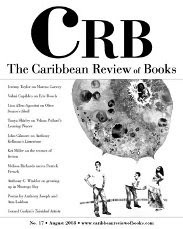
Sometimes I feel it's better not to say anything--to keep quiet rather than to get into a pointless argument. This is not to say that I haven't gotten into a few verbal sparring matches. Once in high school, the verbal sparring even got physical and almost cost me an eye after one of my classmates blindsided me with a punch the day after I had torn his argument to shreds and ridiculed him. I've learned from that experience.
Perhaps this is why I said nothing during a recent conversation which went something like this:
Man: What I'm saying is that back during slavery there were three types of slaves. House slaves sort of like your complexion, Geoff. No offence.
Geoffrey: None taken.
Man: Field slaves and dead slaves. I couldn't have been a house slave. I wouldn't have been a field slave because I'm so much of an individual…I believe in freedom. I would probably have been whipped to death. I could only have been a dead slave!
I let him continue without saying a word.
Up to that point it had been a delightful evening and I knew I'd never see him again. Besides, despite the scars, I still like to think of myself as a JC Old Boy--one who continues the tradition of a Jamaican gentleman (an idea that is now lost in our current vocabulary) by upholding a code of personal honor and integrity.
I probably would have forgotten about the incident if I hadn't heard the idea repeated by a young brother in a different locale and realized how pervasive the idea had become.
Besides being illogical, the idea continues the old slavery paradigm and the division among Black people based on the melanin factor. Rather than saying "Never again" and stopping this idea from gaining life in the next generation (there are many ideas/behaviors that we must end in this lifetime), this line of thinking continues the old "one drop"--not Bob Marley's--and allows this noxious, racist seed to bloom in our lives.
Most importantly, however, the idea dishonors the sacrifice of our ancestors who gave their lives so that we could be free. If an ancestor had not swallowed her pride, I would not be typing these words and my brother would not have been alive to demean her memory. The premise of his argument and his seeming moral superiority is that our ancestors were cowards for living under slavery, and that such conditions would have been so unacceptable to him that it would have resulted in his death. He would no doubt like think of himself as comparable to those Africans who threw themselves overboard from ships like the Zong rather than accept slavery in Plantation America.
But I've had enough of these latter day heroes whose bravery exists only in their febrile imaginations. They denigrate the memory of our ancestors who sucked salt, bore the whip and the yoke of slavery, and invented stories in the dark so that one day their children could argue on luxury liners in the Caribbean about slavery, freedom, heroism, and death.
Enough!
Both memories should be honored. Those who died rather than enter into servitude and those who lived through the holocaust. (And for someone like me whose ancestors stood on both sides of the whip, sometimes forgiven.)
But we should never forget that we are here today because of ancestors who never gave up on the hope of freedom and cut the cane, cooked the ham hocks and the tripe, made miracles out of the mundane, and continued to live even when their backs were breaking, their hands were tired, and their souls were weary with worry. Yet, they continued.
They continued to live.
***
Update (9/26/08): Make sure to check out the Comments!













